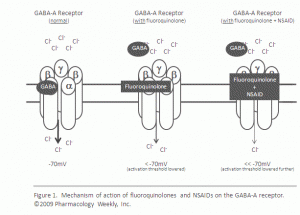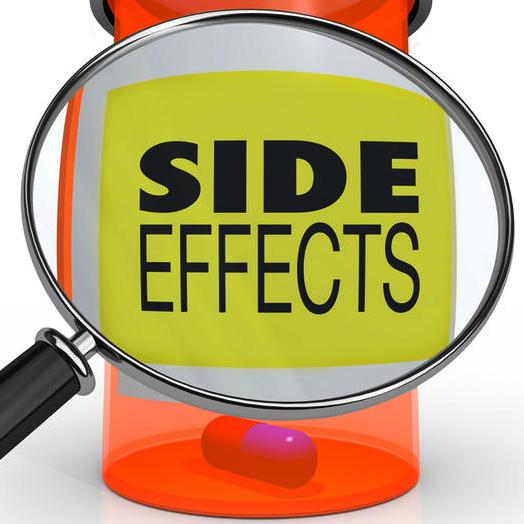There is a huge range in how people react to fluoroquinolone antibiotics (Cipro/Ciprofloxacin, Levaquin/Levofloxacin, Avelox/Moxifloxacin and Floxin/Ofloxacin). Some people take fluoroquinolones repeatedly and never experience an adverse reaction. Some people are left bed-bound after one pill, or one prescription. Some people take a full fluoroquinolone prescription without incident at one time in their life, then, when they take a second (or third, or fourth) prescription, their body goes hay-wire. Some people have a sudden and severe adverse reaction, where they are unable to move or think after previously being fine, and other people have a gradual onset of symptoms where they damage tendons or develop neuropathy slowly, over time.
What determines how a person reacts to fluoroquinolones? The black box warning label on fluoroquinolones states that, “risk (of tendinitis) is further increased in older patients usually over 60 years of age, in patients taking corticosteroid drugs, and in patients with kidney, heart or lung transplants.” But people who fit into those categories aren’t the only people who are hurt by fluoroquinolones. I didn’t fit into any of those categories. I was 32, athletic, strong, not on any medications, etc. when I was sickened by Cipro. I was healthy. But fourteen 500 milligram pills of Cipro (half taken in 2009 without incident and half taken in 2011 with a sudden severe adverse reaction) were enough to cause my body and mind significant harm.
I must have had risk factors that made me susceptible to fluoroquinolone toxicity though, because Cipro made me quite sick. I’m honestly not sure what those factors are (no one knows – or at least they aren’t publishing papers about it if they do). Perhaps those who are hurt by fluoroquinolones have depleted liver enzymes and therefore they aren’t able to metabolize drugs like people who have more robust supplies of drug metabolizing enzymes. Perhaps people who suffer from fluoroquinolone toxicity are depleted of cellular magnesium, as magnesium has been shown to have protective effects on cells that are exposed to fluoroquinolones. Perhaps the microbiome of those who are hurt by fluoroquinolones is depleted of good bacteria and an overwhelming number of bad bacteria in the gut leads to many of the symptoms of fluoroquinolone toxicity. Perhaps there are some people who are genetically predisposed toward having an adverse reaction to fluoroquinolones. As with everything, there is a mix of genetics and environment that goes into how the body reacts when faced with a chemical onslaught. Human bodies are unbelievably complex and multifaceted; once individual differences are considered, the complexity becomes mind-boggling.
Customizing medicine is difficult. The entire human genome, though sequenced, has not yet been mapped out. We are not at a point yet where we can easily and inexpensively test genes and interpret the results of genomic tests.
Genes aren’t the only things that determine how a person reacts to a drug. The microbiome also plays an important role in determining drug metabolism. Per an article entitled, Role of Intestinal Microflora in Xenobiotic-induced Toxicity, “individual differences in the intestinal microflora may result in individualized xenobiotic (a chemical or substance that is foreign to an organism or biological system) toxicities.” The differences in the bacteria in our gut make a difference in how drugs are metabolized. As the microbiome is changed, through drugs – especially antibiotics, the reaction of the individual patient to formerly well tolerated drugs, can change.
Until customizing medicine to the individual becomes feasible, what are doctors supposed to do to prevent their patients from having a dangerous adverse reaction to a drug? Drugs with potentially devastating adverse effects could be avoided entirely unless they are necessary to save a life. This is the policy that I would like to see applied to fluoroquinolones. (The cellular damage that fluoroquinolones inflict make their use inappropriate for infections that are not life-threatening.) Unfortunately, prudence in regards to prescribing fluoroquinolones is not the current trend. In 2011, 23.1 million prescriptions for fluoroquinolones were written in the U.S., and despite the 43 page warning label that comes with Cipro/Ciprofloxacin, fluoroquinolone toxicity is denied by many physicians. As much as I would like to cut the number of fluoroquinolone prescriptions by 90%, the entire medical establishment is not yet listening to me and others who are screaming about the pain and suffering caused by fluoroquinolones. To reduce the number of people hurt, either a study or news story must induce a paradigm shift enabling all doctors to see that fluoroquinolones are vastly more dangerous than penicillin, or patients (especially those in the risk categories listed below) must ask their doctors to not prescribe them.
Though the true risk factors for fluoroquinolone toxicity (genetic, enzyme and microbiome markers) are not yet established, there are some groups of people who are at higher risk of an adverse reaction than others. They should never be given fluoroquinolones. Those groups are:
- People who have had an adverse reaction to a fluoroquinolone in the past. Despite the fact that all of the warning labels for fluoroquinolones state that they should not be given to people with a history of hypersensitivity to fluoroquinolones, the recommendation that they be avoided is often ignored. This is the case because people often don’t realize that they are having a mild adverse reaction to a fluoroquinolone. Who would think that muscle twitches, insomnia, urgency when urinating or loss of endurance would be related to the administration of an antibiotic? The connection is so bizarre that it is often not recognized. A list of warning signs that your body has reached its threshold for fluoroquinolones can be found here: Warning Signs of Fluoroquinolone Toxicity.
- Athletes. It is well documented and known that fluoroquinolones degrade the structure of tendons. They “exert a toxic effect not only on tendons but also on cartilage, bone, and muscle,” per a Mayo Clinic affiliated article entitled Musculoskeletal Complications of Fluoroquinolones: Guidelines and Precautions for Usage in the Athletic Population. Further information about why the Mayo Clinic researchers note that, “Athletes should avoid all use of fluoroquinolone antibiotics unless no alternative is available” can be found here: Deciphering the Pathogenesis of Tendonopathies: A Three Stage Process.
- People on steroids. Steroids are contraindicated with fluoroquinolones. As is noted in the Cipro/Ciprofloxacin warning label, people who are on corticosteroids are at an increased risk of tendonitis when administered fluoroquinolones. In addition to the increased risk of tendon damage, the combination of steroids and fluoroquinolones can increase the risk of development of a deadly glabrata fungal infection.
- People who need to take NSAIDs regularly. NSAIDs, and other drugs that contain a carboxylic acid molecule, are contraindicated with fluoroquinolone toxicity. Patients suffering from fluoroquinolone toxicity have reported adverse reactions to NSAIDs even weeks or months after they have stopped taking fluoroquinolones. The adverse interaction between fluoroquinolones / fluoroquinolone toxicity and NSAIDs is likely because of the formation of poisonous acyl glucuronides. Articles describing this process can be found on Fluoroquinolone Links and Resources.
- Immunocompromised individuals. Fluoroquinolones, and other broad spectrum antibiotics, kill good bacteria along with harmful bacteria. When the good bacteria in the gut are wiped out, they can no longer keep the bad bacteria, or fungal infections, in check. Fungal infections can take over a person’s body and they can be deadly. This can happen with people who have healthy immune systems. For people with already compromised immune systems, vulnerability to fungal infections may be increased. Per an article in Life Extension Magazine, “Anyone can acquire a fungal infection, but the elderly, critically ill, and individuals with weakened immunity, due to diseases such as HIV/AIDS or use of immunosuppressive medications (such as corticosteroids), have a higher risk.”
- People with mitochondrial dysfunction. Per an article entitled Mitochondrial Reactive Oxygen Species Control T Cell Activation by Regulating IL-2 and IL-4 Expression: Mechanism of Ciprofloxacin-Mediated Immunosuppression, “ciprofloxacin was also shown to deplete the mitochondrial DNA (mtDNA) content, thus leading to mitochondrial dysfunction and retarded cellular growth.” Ciprofloxacin and other fluoroquinolones damage mitochondria. Those with preexisting mitochondrial dysfunction will suffer more as their mitochondria are further damaged.
- Children. Fluoroquinolones have been shown to degrade cartilage in juvenile animals and, for this reason, are generally considered to be contraindicated in the juvenile population. Unfortunately, children are still prescribed fluoroquinolones by pediatricians who are unaware of the severity of adverse reactions to fluoroquinolones.
Until medicine is more individualized and every factor that makes a person more or less susceptible to experiencing an adverse reaction to a drug can be tested before that drug is administered, everyone who takes a fluoroquinolone is at risk of experiencing an adverse reaction. The best way to protect oneself from fluoroquinolone toxicity is to not take a fluoroquinolone. Though there are some risk factors that make some groups of people more susceptible to experiencing a severe adverse reaction to fluoroquinolones than others, there is no guarantee that not fitting into one of those groups will ensure your safety. With that noted, the people who fit into any of the seven categories listed above should avoid fluoroquinolones whenever possible.
Information about Fluoroquinolone Toxicity
Information about the author, and adverse reactions to fluoroquinolone antibiotics (Cipro/ciprofloxacin, Levaquin/levofloxacin, Avelox/moxifloxacin and Floxin/ofloxacin) can be found on Lisa Bloomquist’s site, www.floxiehope.com.
Participate in Research
Hormones MatterTM is conducting research on the side effects and adverse events associated with the fluoroquinolone antibiotics, Cipro, Levaquin, Avelox and others: The Fluoroquinolone Antibiotics Side Effects Study. The study is anonymous, takes 20-30 minutes to complete and is open to anyone who has used a fluoroquinolone antibiotic. Please complete the study and help us understand the scope of fluoroquinolone reactions.
Hormones MatterTM conducts other crowdsourced surveys on medication reactions. To take one of our other surveys, click here.
To sign up for our newsletter and receive weekly updates on the latest research news, click here.
What Else Can I Do To Help?
Hormones MatterTM is completely unfunded at this juncture and we rely entirely on crowdsourcing and volunteers to conduct the research and produce quality health education materials for the public. If you’d like help us improve healthcare with better data, get involved. Become an advocate, spread the word about our site, our research and our mission. Suggest a study. Share a study. Join our team. Write for us. Partner with us. Help us grow. For more information contact us at: info@hormonesmatter.com.
To support Hormones Matter and our research projects – Crowdfund Us.
This post was published previously on Hormones Matter in January 2014.


















